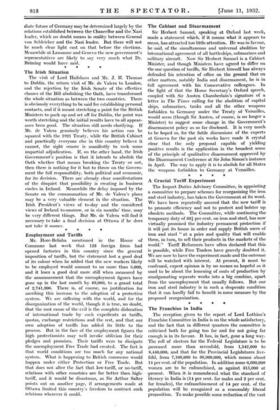The Cabinet and Disarmament • Sir Herbert Samuel, speaking at
Oxford last week, made a statement which, if it means what it appears to mean, has attracted too little attention. He was in favour, he said, of the simultaneous and universal abolition by international agreement of all battleships, submarines and military aircraft. Now Sir Herbert Samuel is a Cabinet Minister, and though Ministers have agreed to differ on the one question of tariffs, Sir Herbert himself has always defended his retention of office on the ground that on other matters, notably India and disarmament, he is in full agreement with his Conservative colleagues. In the light of that the Home Secretary's Oxford speech, coupled with Sir Austen Chamberlain's signature of a letter in The Times calling for the abolition of capital ships, submarines, tanks and all the other weapons forbidden to Germany under the Treaty of Versailles, would seem (though Sir Austen, of course, is no longer a Minister) to suggest some change in the Government's disarmament policy as so far disclosed. It is very much to be hoped so, for the futile discussions of the experts at Geneva for the past six weeks have made it crystal clear that the only proposal capable of yielding positive results is the application in the broadest sense of the principle of qualitative disarmament approved by the Disarmament Conference at Sir John Simon's instance in April. The way to apply it is to abolish for all States the weapons forbidden to Germany at Versailles.
* * * *


































 Previous page
Previous page